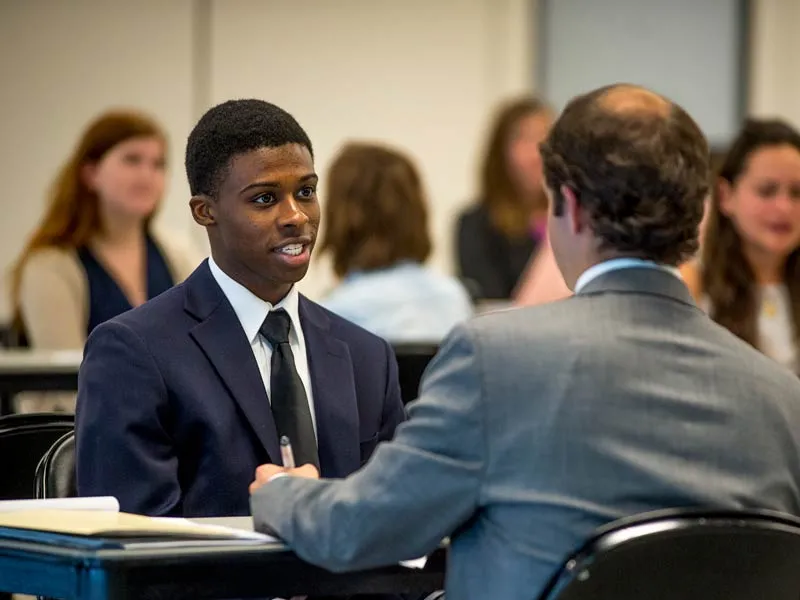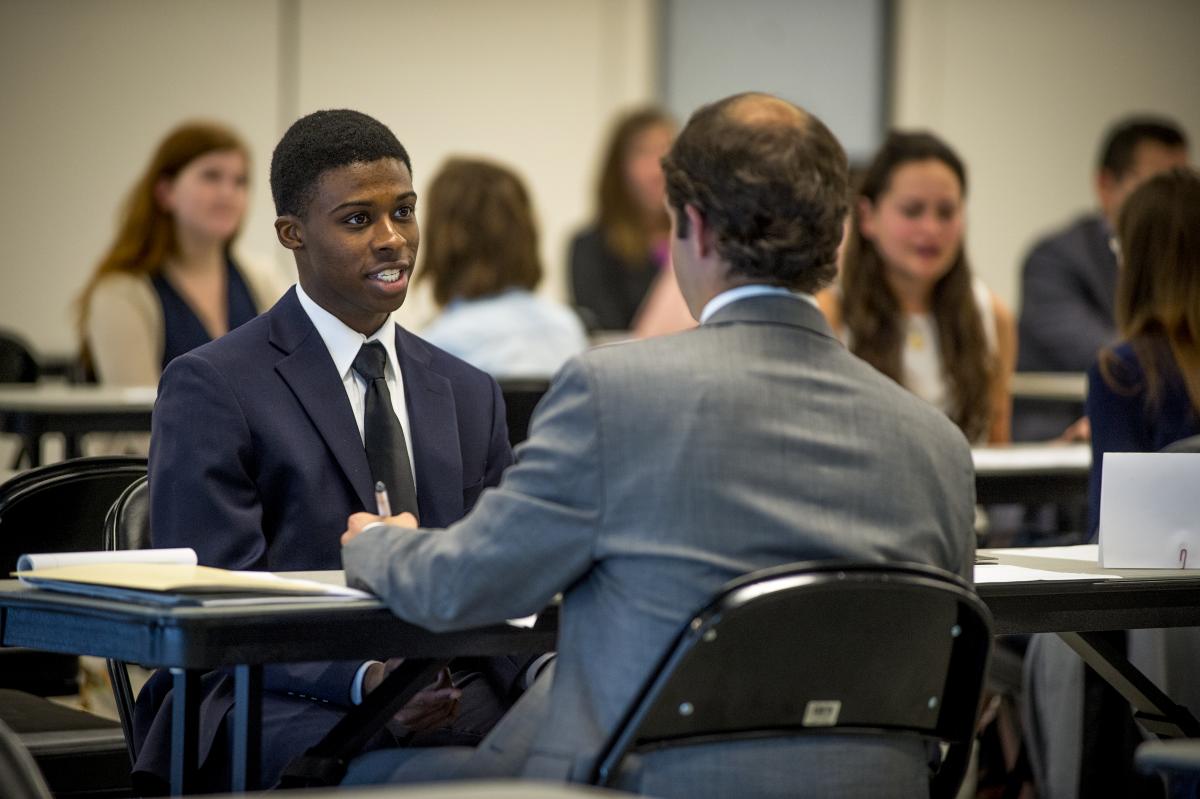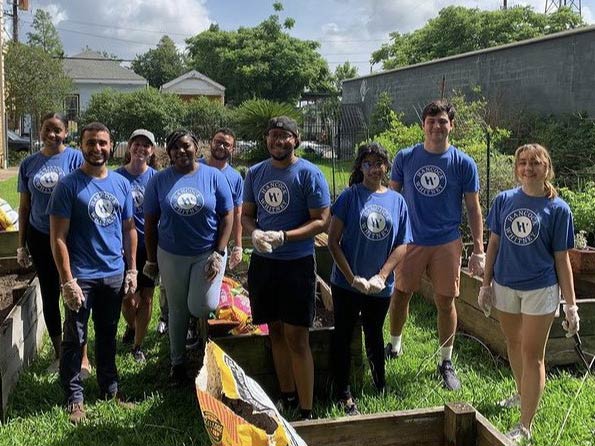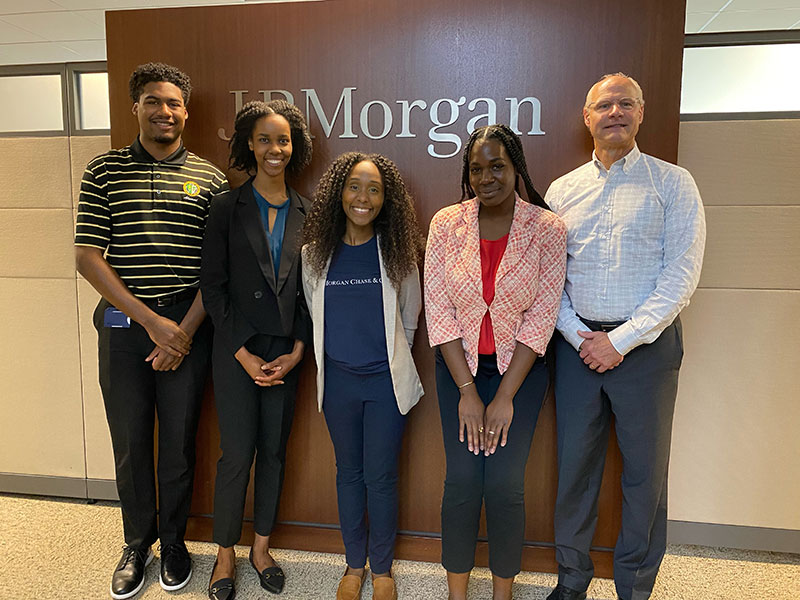

Paths to a Rewarding Career
with Adam McKeown and Edward Cruz
Originally published in the Tulane School of Liberal Arts Magazine, Winter 2022
As the Fall 2021 semester approached, Adam McKeown, Associate Professor in the Department of English and manager of the School of Liberal Arts Internship Program, and Edward (Eddy) Cruz, Assistant Dean and Executive Director of Newcomb Tulane College Career Services, met over Zoom to talk about their respective roles in helping students prepare for successful careers. McKeown and Cruz discuss what employers are looking for, why liberal arts graduates are excelling in preparing for careers of the future, and how Tulane is taking steps to create a more equitable and inclusive environment so that all students can reach their potential.
Adam McKeown (AM): While I have my responsibilities as a professor, I have also enjoyed a professional life beyond the academy that allows me to stay connected to my passions for government work—I’ve served in the Marine Corps reserve for twenty-nine years. I love helping students with internships and career growth because I know firsthand that all of us have many different passions and talents, and there are many different career paths that will allow us to explore them. Overall, I want to help students succeed in their careers and be happy. To do so, they need to believe in themselves and have the support of the people surrounding them to do their best and explore the countless career options available to them.

Edward Cruz (EC): Definitely, Adam. In my role in Newcomb-Tulane College Career Services, I see this coming into play in how our office approaches career education. For us, this looks like focusing on a nonlinear process. We’re teaching students how they can prepare for many opportunities, not just one career pathway. I think this takes some pressure off students because it helps them focus on exploring their skills and their experiences so they can prepare themselves for chance opportunities. This gives students freedom and empowerment to find what leads them to their passion and happiness.
AM: There are many career possibilities out there, and we have to remind students that there are many ways to be a qualified and excellent job candidate.
EC: Our office always has in mind some key competencies that are outlined by the National Association of Colleges and Employers. These include career and self-development, communication, critical thinking, equity and inclusion, leadership, professionalism, teamwork, and technology. The role of our office is to help students identify their actions and their experiences and how they fit into these different competencies so they can verbalize this to employers clearly.
AM: This is so important because what I’ve begun to notice with employers is that unless the skillset they’re looking for is very defined and technical, the hiring process is amazingly personal. Employers will often hire someone they like working with and trust that the candidate will learn specific skills along the way. That’s one of the exciting things about internships to me—many young people are hired to do a particular job, but in the process, they get to know a potential future employer. That relationship is crucial to the job opportunity. I think the workplace right now has become more personal than ever before.

EC: This brings me to the question, “What makes a liberal arts degree special today?” A lot of one’s ability to adapt to a changing environment is having a strong foundation in research, critical thinking, and reasoning. Change is constant, whether it is a global pandemic or our normal day-to-day, and things are always shifting within different industries. A liberal arts background provides students with a notably diverse set of skills. They don’t have just one specific toolbox; instead, they’re able to share all the different skills they garner and all the things that they’re exposed to within an interdisciplinary approach in the classroom—this is something that really sets them apart.
AM: I think another important thing to stress for university students is that now is not the time to micromanage oneself—this is the time to shake off prejudices as to what a certain career or academic experience looks like. I think the liberal arts aid our students in doing this because they focus on open-ended intellectual growth. You might be very good at one thing or another, but you might find out you’re actually very good at—or enjoy—a completely different thing entirely if you have the chance to see what that workplace or those people are like, as well as what that different path might have to offer. There are so many ways to find a rewarding career right now; you just have to be open, and the liberal arts, I think, prepare you to be open.
EC: What you’ve just shared reminds me of the importance of understanding what somebody truly values and how that plays into their career. Before you know it, if you’re on a career path where your passion or values aren’t supported, it can come to an abrupt stop. So this is one thing we are always thinking about—realizing that your career can lead you to interesting places if you honor your values and passions.
AM: Definitely! I remember talking with a liberal arts graduate once that was very passionate about the environment and went on to work for a mining company. When I talked to her about it later, she said that she felt she could really make a difference by actually talking to people at the mines and in the communities in order to encourage them to examine their decisions and the environmental effects of mining. You wouldn’t automatically think a mining company would be a place where a person with those values would be satisfied, but you don’t know until you try.
EC: My passion and values come down to helping people and I learned that pretty early on coming to university as a first-generation college student. I saw this exemplified in roles of doctors and lawyers, but I found the path of higher education through volunteer opportunities on campus. But as you’ve shared, Adam, depending on where you find yourself and what table you’re sitting at, influence and opportunity can change your course quite a lot. That’s really what keeps me going—I’m excited about the work that I do not only as an individual but as a team in our office, helping students reach their potential and be happy in the process.
AM: As I’m listening to you, I feel like we are both thinking about the internship gap. Essentially, students who take part in internships now are more likely to succeed throughout their careers, but not everyone has the same opportunity to participate in internships. The reasons for this is that many internships are unpaid or pay minimally, so students who can’t participate in an internship due to lack of money or time might be less likely to succeed. We see this echo through academia as well, in terms of who can afford to spend six to ten years working on their doctorate, unpaid or paid minimally, to become a full-time professor. Personal finances have a major gatekeeping function.
EC: Completely. At Tulane, we have a variety of opportunities for students to gain support to allow them to pursue internships that might be unpaid. The Center for Public Service has compiled a list of these funds for students. Each opportunity provides a brief description of eligibility and the amount of funding available. Students can locate this list directly on the CPS website (Tulane Funding and Student Awards, Scholarships, and Grants). The university and our alumni, parents, and families strive to bridge the gap each year for our students.
AM: I think you’re touching upon the fact that creating opportunities is something that must be addressed beyond a career services department or office. I think that all of us in higher education need to be aware of the internship gap and how we can work towards equity beyond the university by closing the internship gap. Doing so will help create access to career options, since people are more likely to enter career fields in which they feel comfortable, and where they speak the language, literally or figuratively, of the place where they’ll be working. Internships help create that comfort level.
EC: Absolutely. To be 100 percent transparent, I still experience this today coming into spaces I might not be as familiar with or as someone who was a first-generation college student. And as you’ve expressed, we have to address this as an institution. We are talking about welcoming the most diverse class to Tulane, and this includes economic and social diversity. And for those students in particular, if we’re not talking about paid versus unpaid internships ahead of time, sooner or later it’s going to come up as a bigger problem. We need to make sure that we’re thinking about these things and providing opportunities upfront before students with these diverse backgrounds come here, so we can be supportive.
AM: And in addition, we need to be active participants in showing our students what they can do. We need to actively link individuals with opportunities.
EC: Even when those opportunities might not work out as well as they thought! This goes back to the importance of the nonlinear approach we began the conversation with—for example, if you don’t get this internship or this job doesn’t mean that you necessarily failed, it just might be that you’re not the right person for it right now. This shift might create a completely new pathway to success and happiness.

